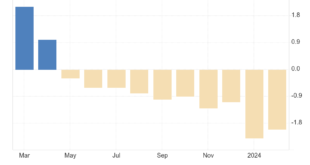New York was the toughest nut for the Federalists to crack. For here was one state where not only was the population overwhelmingly opposed to the Constitution, but the opposition was also in firm and determined control of the state government and the state political machinery. Here was a powerful governor, George Clinton, who would not, like Hancock and Randolph in the other critical states, yield to a sellout under pressure. Clinton had been a highly popular...
Read More »Swiss Franc at risk as inflation diverges from SNB forecasts
Swiss Franc is vulnerable as inflation data continues to undershoot official forecasts. The SNB expected inflation to average 1.9% in 2024 in its December forecast, but it currently sits at 1.2%. The latest Producer and Import Prices showed the tenth month of deflation in a row. The Swiss Franc (CHF) trades flat at the end of the trading week – off by barely a few hundredths of a percent in its most traded pairs. The overal fundamental...
Read More »From Athens to Vienna: Understanding a System of Ethics
The Political Thought of David Hume: The Origins of Liberalism and the Modern Political Imaginationby Aaron Alexander ZubiaNotre Dame 2024; 366 pp.The central thesis of Aaron Zubia’s very scholarly book will be of interest to students of Ludwig von Mises. Zubia argues that the thought of David Hume underlies contemporary liberalism. He intends “liberalism” broadly, so that it encompasses not only twentieth-century liberalism, but classical liberalism as well....
Read More »Will Oklahoma’s Legislature Embrace Sound Money? Maybe
On February 5, 2024, Oklahoma Representative Cody Maynard introduced House Bill 3027, which would eliminate all capital gains taxes on gold and silver and expand legal tender to include not only gold and silver coins issued by the US government, but other specie that an Oklahoma court rules to be within state authority to make or designate as legal tender. While the bill has yet to be debated and passed in the Oklahoma House, this could be a realistic step toward...
Read More »Sebag and Natural Money
Natural orders are things that emerge on their own or reflect the true nature of how something is or was meant to be. Two of my favorite books, both of which dramatically changed my outlook on the world, are A Hunter-Gatherer’s Guide to the 21st Century (by biologists Heather Heying and Bret Weinstein) and Company of Strangers: A Natural History of Economic Life (by economics professor Paul Seabright). Even though they deal with different subject matters, what unites...
Read More »Euro’s Recovery to $1.09 Looks Vulnerable while Yen Falls to New Lows for the Week After Strong Pay Raises Confirmed
Overview: At the end of last week, the derivatives market was again pricing in nearly four Fed cuts this year, but this week's data have seen expectations re-converge with the Fed's three rate cuts signaled in December, while cutting the odds of June hike to the lowest in the more than four months. This has helped lift the dollar against all the G10 currencies this week. As is often the case in a firm US dollar environment, the Canadian dollar has fared the best,...
Read More »Zurechtkommen mit der Komplexität des Klimawandels. Eine genauere Betrachtung der wissenschaftlichen Methode und ihrer Einschränkungen
Zurechtkommen mit der Komplexität des Klimawandels. Eine genauere Betrachtung der wissenschaftlichen Methode und ihrer Einschränkungen 15. März 2024 – von Frank Hollenbeck Die physikalischen Wissenschaften haben bei der Erforschung einfacher Phänomene große Fortschritte gemacht. Bei einem einfachen Phänomen haben wir eine begrenzte Anzahl wichtiger Variablen, die alle identifizierbar und messbar sind. Dies ermöglicht es uns, ein wissenschaftliches...
Read More »Why We Don’t Need Government Funding for “Moonshots”
Tu ne cede malis, sed contra audentior ito Website powered by Mises Institute donors Mises Institute is a tax-exempt 501(c)(3) nonprofit organization. Contributions are tax-deductible to the full extent the law allows. Tax ID# 52-1263436 [embedded content] Tags: Featured,newsletter
Read More »Protectionism Doesn’t Decrease “Food Insecurity”; It Increases It
Achieving food security is a priority of political parties regardless of ideology. Therefore, countries work assiduously to ensure that this project is accomplished. The proactive approach to tackling the issue is admirable, but in their pursuit of food security, some countries adopt counterproductive policies. The assumption that protectionism alleviates the risks of food security is still embraced by many policymakers when there is no correlation.Such muddled...
Read More »The Michigan Verdict Is “Groundbreaking” as in Burying the Law
In convicting James Crumbley of involuntary manslaughter yesterday, a Michigan jury’s verdict was “groundbreaking,” according to CNN. While the term was meant to describe a “new direction” in the application of criminal law, perhaps it is more appropriate to think of the jury’s actions as breaking ground in an attempt to bury what is left of the criminal law this country inherited from England.That is not a good thing. For all the faults in the application of US...
Read More » Swiss Economicblogs.org
Swiss Economicblogs.org




